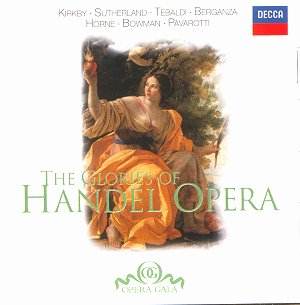The Glories of Handel
Opera
HANDEL
Alcina: Tornami a vagheggiar (amA); Dream Music (nE); Sta nell'Ircana
pietrosa tana (doy); Atalanta: Care selve (arr. Gamley) (jry);
Berenice: Si, tra i ceppi e le ritorte (ktx); Ezio: Se un
bell'ardire(lnB); Giulio Cesare: Piangerò la sorte mia (dsz);
Da tempeste il legno infranto (bqy); Orlando: Ah Stigie larve! Già
latra Cerbero; Vaghe pupille, non piangete (imA); Riccardo Primo:
Atterrato il muro cada (huF); Rinaldo: Armida disperata! …
Lascia ch'io pianga (enC); Rodelinda: Io t'abbraccio (bgwy); Dove
sei, amato bene? (fvD); Semele: Hence, Iris, hence away (fqy); Serse:
Frondi tenere … Ombra mai fu
(cpy).
 Emma Kirkby (soprano) (a),
Joan Sutherland (soprano) (b), Renata Tebaldi (soprano) (c), Teresa Berganza
(mezzo-soprano) (d), Bernadette Greevy (mezzo-soprano) (e), Marilyn Horne
(mezzo-soprano) (f), Alicia Nafé (mezzo-soprano) (g), Sara Mingardo
(contralto) (h), James Bowman (counter-tenor) (i), Luciano Pavarotti (tenor)
(j), Sir Geraint Evans (bass) (k), Forbes Robinson (bass) (l), The Academy
of Ancient Music (m), Academy of St. Martin-in-the-Fields (n), London Symphony
Orchestra (o), New Philharmonia Orchestra (p), New Symphony Orchestra of
London (q), Orchestra del Teatro Comunale di Bologna (r); Orchestra of the
Royal Opera House, Covent Garden (s), Suisse Romande Orchestra (t), Les Talens
Lyriques (u), Vienna Cantata Orchestra (v), Welsh National Opera Orchestra
(w), conducted by Bryan Balkwill (x), Richard Bonynge (y); Sir Alexander
Gibson (z), Christopher Hogwood (A), Philip Ledger (B), Raymond Leppard (C),
Henry Lewis (D), Sir Neville Marriner (E), Christophe Rousset
(F).
Emma Kirkby (soprano) (a),
Joan Sutherland (soprano) (b), Renata Tebaldi (soprano) (c), Teresa Berganza
(mezzo-soprano) (d), Bernadette Greevy (mezzo-soprano) (e), Marilyn Horne
(mezzo-soprano) (f), Alicia Nafé (mezzo-soprano) (g), Sara Mingardo
(contralto) (h), James Bowman (counter-tenor) (i), Luciano Pavarotti (tenor)
(j), Sir Geraint Evans (bass) (k), Forbes Robinson (bass) (l), The Academy
of Ancient Music (m), Academy of St. Martin-in-the-Fields (n), London Symphony
Orchestra (o), New Philharmonia Orchestra (p), New Symphony Orchestra of
London (q), Orchestra del Teatro Comunale di Bologna (r); Orchestra of the
Royal Opera House, Covent Garden (s), Suisse Romande Orchestra (t), Les Talens
Lyriques (u), Vienna Cantata Orchestra (v), Welsh National Opera Orchestra
(w), conducted by Bryan Balkwill (x), Richard Bonynge (y); Sir Alexander
Gibson (z), Christopher Hogwood (A), Philip Ledger (B), Raymond Leppard (C),
Henry Lewis (D), Sir Neville Marriner (E), Christophe Rousset
(F).
 Decca 458 249-2 [77'
16]
Decca 458 249-2 [77'
16]
Crotchet
Midprice

A great deal of water has gone under the bridge of Handelian interpretation
over the last half-century, and this collection risks shooting itself in
the foot by starting with the three most recent items. Here we have original
instruments, detached bowing, brilliant rhythms and "authentic" voice production.
What "authentic" voice production really is can be anyone's guess but the
fact is that a present-day specialist like Emma Kirkby demonstrates a total
ease in the florid writing whereas a singer trained in the Mozart-Rossini
repertoire such as Teresa Berganza seems to have to work a lot harder. When
the first generation of baroque-specialist singers arrived on the scene all
these operas took on a new lease of life, but it did seem that a singer would
have to choose between a repertoire which stopped with the baroque or one
which started after it. A singer of the latest generation, Sara Mingardo,
who is heard to good effect in an aria from Riccardo Primo, may yet show
is that this need not be so.
Decca, thanks to the L'Oiseau-Lyre label, probably has a more distinguished
back-catalogue of Handel opera than any other company, but instead of drawing
on those excellent pioneering sets led by Sir Anthony Lewis they have preferred
to go for the big names. With a souped-up accompaniment by Douglas Gamley
"Care selve" hardly counts as Handel at all and Pavarotti's voice seems to
have been caught away from the microphone at the beginning and at several
other points (or is he attempting a head-voice, Lauri-Volpi style?). Not
one of his more treasurable moments. The Italians have a bad habit of singing
the so-called Largo at weddings with religious words and Renata Tebaldi,
after a perfunctory recitative (was she sight-singing it?) disregards the
operatic context and gives us the full Mascagni treatment (gloriously sung,
it has to be said). George Hall's useful introduction rightly points out
that Handel's marking is Larghetto; rarely have notes and performance
been at such odds.
Alongside these, Sutherland, Berganza and Horne all make valiant efforts
in the right direction. Berganza's Piangerò and Horne's Dove
sei are finely sung by any standard; Sutherland concludes the disc with
a virtuoso display (Da tempesta il legno) though her partner in the
Rodelinda duet is not on her level. But today these performances are likely
to be appreciated more by fans of the singers than admirers of Handel. It
is interesting to note how Bonynge, chameleon-like, can be crisp and "authentic"
or slushy, according to whom he is accompanying.
Although Decca chose to ignore the old L'Oiseau-Lyre sets, it is still the
British-based performances, of the older recordings, which show more style.
It was a pleasure to hear the items by Forbes Robinson, Sir Geraint Evans
and, especially Bernadette Greevy, who should have recorded far more. And,
as a purely orchestral interlude, Sir Neville Marriner gives an excellent
interpretation of the Dream Music from Alcina.
The recordings all come up well, but I found I had to adjust the volume level
sometimes between one item and the next. The engineers managed rather better
on the companion Rossini disc. I am not quite sure who the collection is
aimed at since most people will like parts of it and hardly anyone will enjoy
it all. Still, the genius of Handel seems to transcend the various limitations.
Texts and translations are provided.
Christopher Howell

